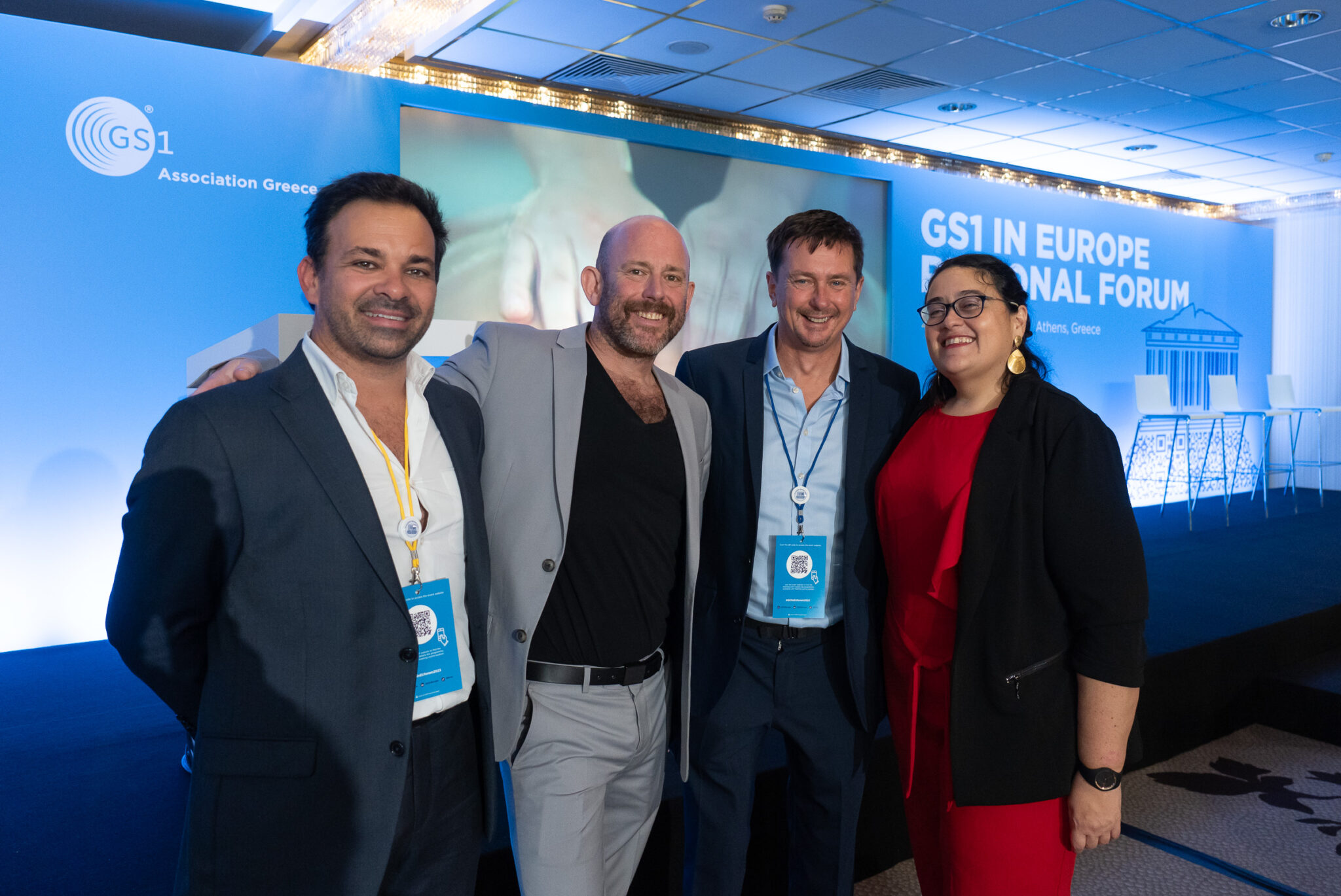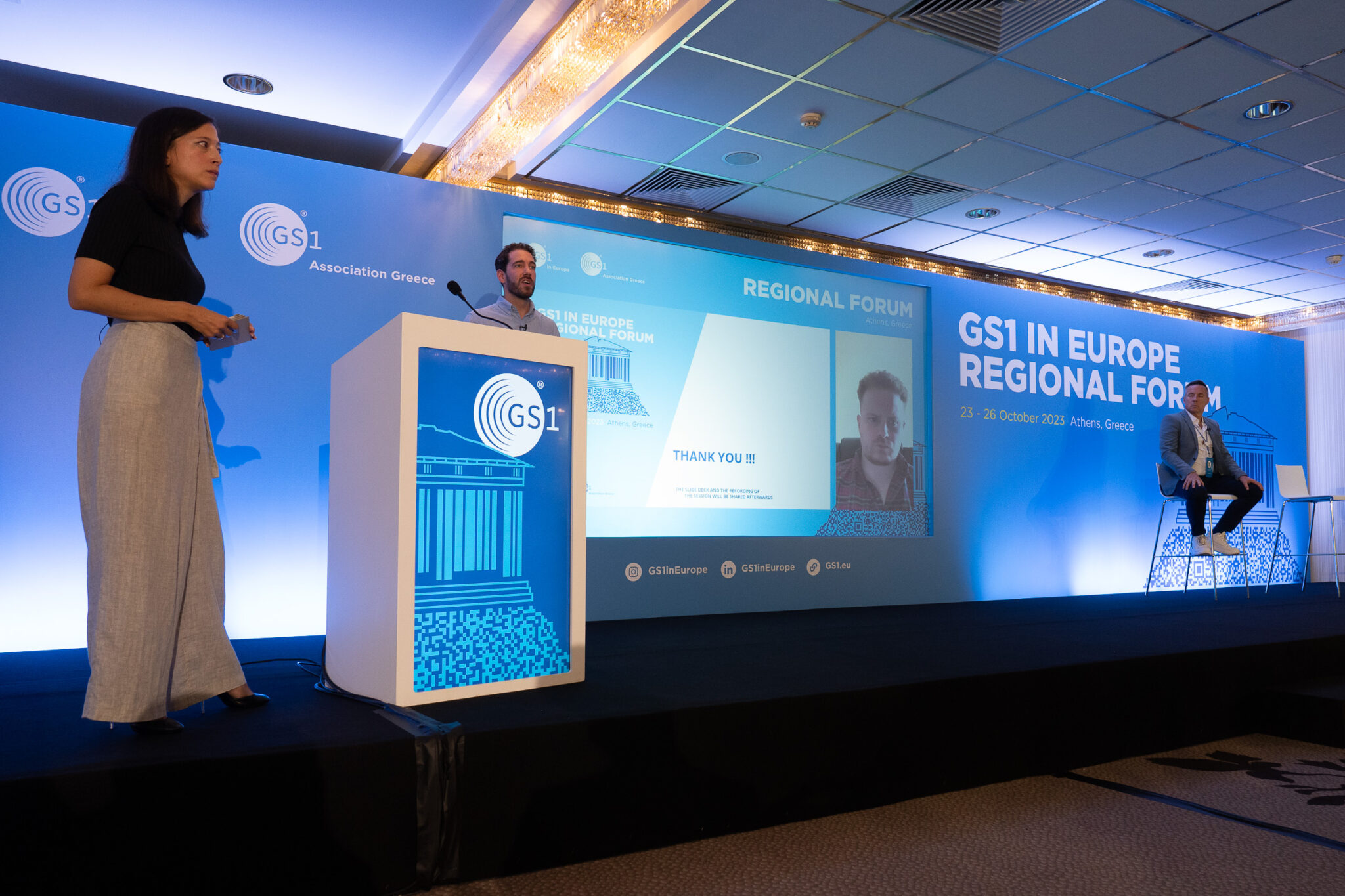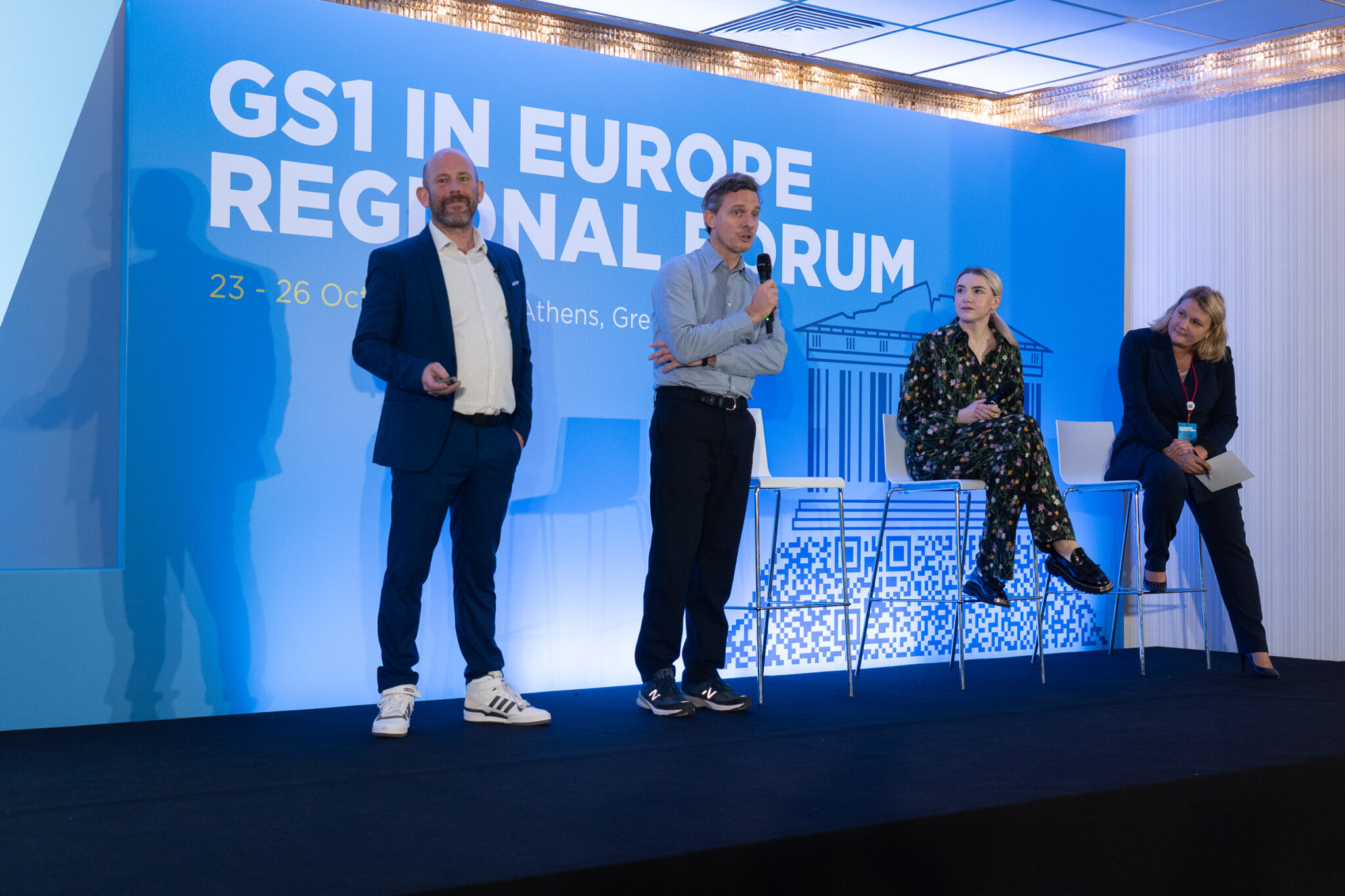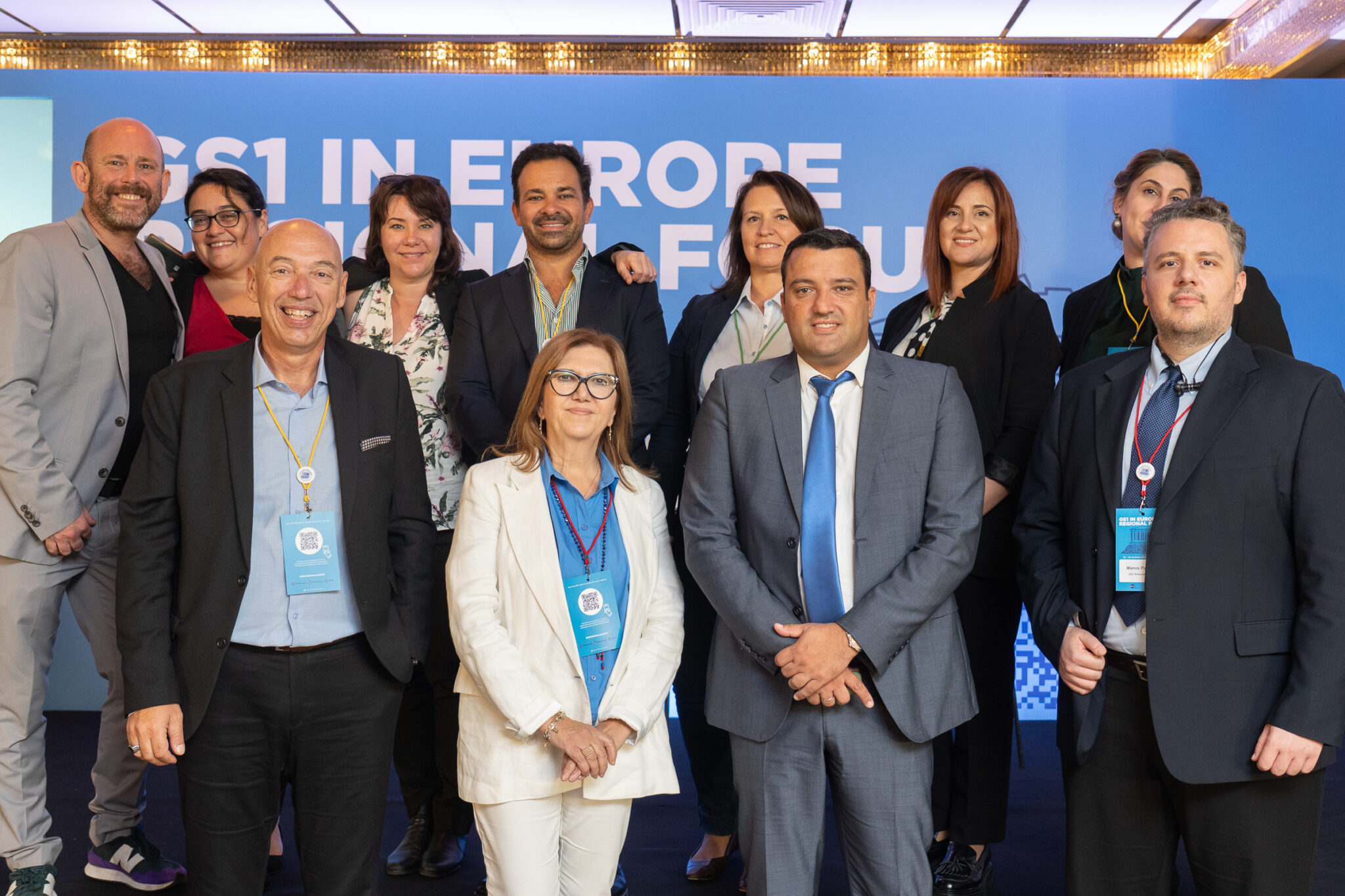In October 2023, we gathered in Greece for another Regional Forum – the time of year when we bring the GS1 community together to share knowledge and experiences, meet colleagues from all over Europe and learn from each other. At the end of the event, we all left Athens richer, more inspired and motivated.
Over the four days of the Forum, we had 32 workshops, 4 plenary sessions and one unforgettable Flash Walk, counting 328 participants in-person, 326 online, from 59 different countries.
During the 4 plenaries we addressed many different interesting points, related to GS1 system, featuring insights from a diverse group of industry speakers. Ready below the short summaries per plenary session.
OPENING PLENARY – IT ALL STARTED IN GREECE

For the opening session, being in the cradle of Western civilization and modern thought, there’s nothing better than starting this week with a look at the big trend of the moment, which is bound to change the way we think and act: Artificial Intelligence.
Nick Lansley (Director and Innovation Insider at Lansley Consultancy Limited) helped to demystify Artificial Intelligence a little, explaining how it works and how it mimics the human brain – learning, reasoning, making decisions and, just like us, making a few mistakes. But the major point, which merges with GS1’s operation, is how AI can be a key player in helping to process, standardise and simplify data management.
In this plenary session, we also had an immersive experience. We connected live to GS1 Germany’s headquarters in Cologne, where a room has been built entirely dedicated to Metaverse. In a guided tour led by our colleague Ramona Swhajor and her team, we learnt more about the potential of Metaverse in areas such as e-commerce and branding, and the relevance of GS1 standards in this parallel reality.
THE FUTURE OF ECOMMERCE

The second plenary session – led by Marie Burnay, from GS1 Global Office – looked at the future trends in ecommerce.
The first speaker was Phil Booker (Head of Partnerships at Fruugo), representing the marketplace sector. Although Fruugo is one of the largest platforms – it is present in 45 countries – it is little known to consumers because it is not a destination marketplace: 90% of Fruugo’s traffic starts with a search on Google Shopping. So, in order to have your products approved and listed in Google Shopping suggestions, you need to have a GTIN. This is where GS1 comes in and becomes a key player, making large-scale commercial operations possible.
Representing the Marketing Communications sector was Tom Lindfalk, Managing Director of Flightstory, an agency that helps companies make the digital transformation and be at the forefront. We live in a changing world and wherever there is change, there is always opportunity. In addition to traditional formats, it is increasingly crucial for companies to look at new technologies and social media as important agents that can have a decisive influence on customer decision-making.
The last speaker in this session was Francisco Campos, COO of Onport, a platform provider that helps retailers transform into marketplaces. The company focuses not only on end customers, but also on the vendors and providers that supply the marketplaces. And for retailers to want to become marketplaces, they need to have a simplified data system.
UNPACKING SUSTAINABILITY – THE ROLE OF GS1 IN SHAPING A GREENER FUTURE

We kicked off the session with a live connection to Brussels, where Ilias Iakovidis (Adviser for Digital Aspects of green transition at the European Commission) underlined that the Commission is committed to moving the DPP forward, effectively for everyone involved.
One of the sectors that deserves the most attention when we talk about circularity is textiles, and we had the perspective of the upstream and supply chain branch, with the participation of Ana Biedermann, Sedex, which spoke to us about responsible sourcing – the need to know where materials and products come from, because not only consumers but also companies are increasingly aware of this.
From the downstream sector, we had the example of Decathlon Belgium explained by Bohdan Lamon, which has been at the forefront of ecological practices and circularity, and has created new business models in aspects such as the repair of its products, after-sales services and other elements that help extend the life cycle of thousands of products.
We also heard from Elodie Ozen, Umains, a platform that provides companies with solutions to give products a second life. The way it operates is based on GS1 standards for identifying and capturing, which then allows it to share the information.
UNLEASHING THE POWER OF GS1

To round off this intense and rewarding week, we talked about the future, especially in sectors that are not so visible on the GS1 in Europe stage, such as health, construction, tyres, apparel and textiles.
We started with the insights of Deniss Dobrovolskis, former GS1 Sweden colleague and currently at H&M, who spoke about the importance of Digital Data Carriers covering millions of products, and who made predictions about the future, namely that DPP will lead the way in the large-scale implementation of the QR Code.
From the point of view of Healthcare, Caroline Beecham (Commercial & Distribution Director at BD UK+Ireland), emphasised how much GS1 and GS1 barcodes have contributed to improving healthcare systems around the world and helping to reinforce patient safety.
Riccardo Giovannotti, Secretary General at GDSO, spoke about tyres and car components, a sector in which standardisation is also essential, so that each product is serialised, unique and infallible.
Special thank you to the GS1 Association Greece team for their dedicated efforts in hosting the GS1 in Europe Regional Forum, ensuring a memorable and well-organised event!
Are you a GS1 employee?
Please log in using your GS1 email to access all event recordings, presentations, and photographs.
This article has additional content for GS1 staff only. To access it, you must be logged in with your GS1 account.
